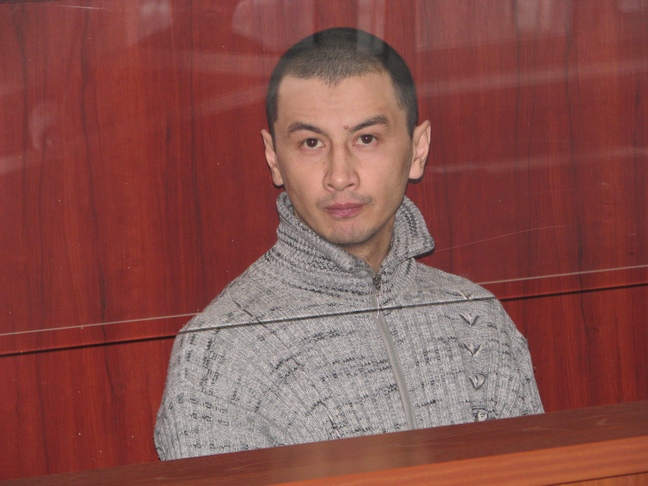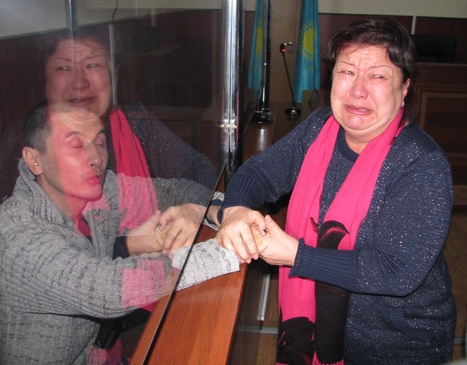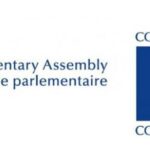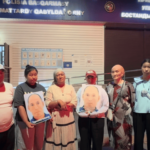“I don’t understand why they brought me to trial. What will be to our generation if they send to prison everyone who listens to music in social networks?” a 33-year-old resident of Almaty, Shukhrat Kibirov, said in his last word to court.

Shukhrat KIBIROV
On January 19, 2018, the district court of Almaty found him guilty and sentenced him to 6 years and 8 months on charges of “incitement of religious hatred” and “propaganda of terrorism” under criminal code. The guilt of the young man was that he allegedly shared five nasheeds (Islamic songs) in Arabic to his page in the VKontakte social network in 2014. The involved state expert has found nothing that would qualify as “propaganda of terrorism” in these songs. Therefore, he indicated in his opinion the standard phrase “there are signs of incitement of religious hatred”. The expert confirmed his opinion at the court session, but his speech disappeared from the mandatory video record of the trial.
The lawyer of the defendant, Galymzhan Nurpeisov, applied to specialists for translation of the songs. As it turned out, they contained no religious propaganda at all. One song was about the motherland, another one was about a mother. Only one song was about Prophet Muhammad and his companion Umar. The judge attached these translations to the case and forgot about them.
Following the sentence, the prosecutor’s office protested in court and asked to increase the duration of custody of Kibirov to 11 years. However, the judge dismissed the protest.
The case of Shukhrat Kibirov is very indicative of the recent years’ fight in Kazakstan against the manifestations of extremism and terrorism.
According to the legal statistics committee of the general prosecutor’s office, 194 criminal cases were initiated under two articles “incitement of hatred” and “propaganda of terrorism” in nine months of this year, and 155 cases of them were brought to trial. Almost the same proportions were reached one year ago: 219 cases out of 352 cases were brought to trial. Acquittals on these charges are rare exceptions that happen two or three times a year.
The majority of such cases are related to the activity of the followers of Islam in social media. Charges with incitement of “ethnic or social” hatred take place in fewer cases. Thus, 200-300 Muslims are imprisoned every year for sharing or citing any speech that is later found to be an extremist one or promoting terrorism. All criminal proceedings are initiated by force authorities and no one has ever complained about being “offended” or “insulted” by such materials.
State experts that give required opinions are involved to legalise prosecution. In such cases, they try to secure themselves and indicate the “signs”, which can be interpreted in any way. The level of knowledge of such experts also raises doubts because there are no competent religious scholars among them.
“Our experts are used as a club. The point is not only how a language expert evaluating texts can give legal assessment to them, but also how he can evaluate the content based on his philological knowledge, not legal. However, it’s only legal knowledge that can help determine the elements of crime,” according to Kazakstan-based human rights activist Evgeny Zhovtis.
In 2017, a resident of Schuchinsk (Akmola oblast), a master of the Islamic university of Medina, Saudi Arabia, Kuanysh Bashpayev, was sentenced to 4.5 years. He was accused of “incitement of religious hatred” for a series of lectures he uploaded to YouTube. In them he criticised the Islamic movements of Ash’arism and Maturidi, which have no followers in Kazakhstan, and very limited number of people are aware of their existence. Before these lectures were banned and Bashpayev was sentenced some other people from this region shared these lectures to their pages. At least two more residents of Schuchinsk were brought to trial for that – Dadash Marzhenov and Galymzhan Abilkairov. However, unlike the lecturer, they were charged with the “propaganda of terrorism”, yet no one explained to them what their propaganda was. Abilkairov was sentenced on October 16 for seven years an seven months in prison – currently his sentence is the last one in a series of similar trials. Marzhenov’s case is still pending.
“The point is that such disputes take place regularly. However, police must not be involved in them. Now our state tends to hold itself out as an Islamic one, not secular. And we gradually move from secularism to theology. But any involvement in theological disputes must not be allowed. We don’t speak about the insult. But every religion thinks that other religions are wrong, and this is quite natural,” religious scholar Artur Artemiev said to CABAR.asia.
The lack of logic and an extremely low level of knowledge of experts can make any internet user who shares some thoughts on religious topics vulnerable to charges in extremism and terrorism.
In 2018, a case was initiated against a follower of non-forbidden in Kazakstan movement of Salafism, a resident of northern Kazakstan city of Petropavlovsk, Timur Davletov. He had the imprudence to share videos where the adherents of Salafism spoke against terrorism and toughly criticised ISIS in Iraq and Syria. Currently, Davletov is held in custody.
“The number of criminal cases under these articles has increased in the last three years. Criminal cases are being poorly investigated and judges turn a blind eye to grave offences of the law. They are charged with alleged dissemination of forbidden materials although their accounts are unknown, or even inglorious. No one can ever enter these accounts. There are deleted accounts. However, new cases appear,” lawyer Bauyrzhan Azanov, whose clients were Dadash Marzhenov and Galymzhan Abilkairov, seemed perplexed.
“The biggest problem is that the majority of cases had no legal consequences – no killers, no victims, no disorders were caused, they contained only text, retweets, shares, or likes,” Evgeny Zhovtis, Kazakstan-based human rights activist, said. “And the only proof of a crime is the examination. And opinions of experts, language experts, political analysts and psychologists don’t contain any affirmative judgements because they are not authorised to do it. They just write that it could result in something, lead to something or provoke anyone to do something. And all guilty verdicts are based on these assumptions of experts. And this is a gross direct violation of the criminal law as our criminal code prohibits verdicts based on assumptions. If there are no proofs of guilt but inferential evidence in a form of an expert opinion, all guilty verdicts, almost 99 per cent, seem to be based on assumptions.”
“The biological age of our experts is 21-22 years old. They cannot answer basic questions. When you ask them specific professional questions related to religion, religious movements, don’t wait for answers, they will just talk round,” lawyer Bauyrzhan Azanov added.
To get an idea of the level of examination in Kazakhstan, it’s enough to read a list of extremist materials banned in the country published on the website of the Committee for legal statistics and special accounts of the general prosecutor’s office.
Among almost a thousand of titles, the majority are titled as: audiofile “Prayer”; videofile “Astray”; brochure “Road”, file “001”; file “10”; text file “Security and safety of information on the internet”; Talmud 2; Lecture; Politics and foreign policy; Palestinian children tell about their life; New nasheed, etc. Some experts tend to think that prosecutors don’t try to understand the materials and automatically copied the names from court verdicts.
However, it will be fair to say that the authorities of Kazakhstan apply the same approaches to initiate new criminal cases on “incitement of ethnic or social hatred”. A businessman of Aktobe, Sanat Dossov, was sentenced on the same charges because on Facebook he gave offensive assessments to Russian president Vladimir Putin, and Pavlodar-based rapper Ruslan Ginatulin was also sentenced for sharing video on YouTube that criticised the actions of Russian skinheads.
Three agencies – police, National Security Committee and prosecutor’s office – watch the activities of Kazakstanis on the net. In early January 2018, Kazak minister of information and communications Dauren Abayev reported the creation of the automated system of the national media scene monitoring. According to him, “this system will help us identify and know the amount of information published in state language. We need monitoring system to examine this information according to the law.”
The initial cost of the project is estimated at 4 million euros and the system is planned to be developed by the end of this year. There’s a fear that this system will enable force authorities to watch the Kazakstanis on the net.
“These measurements that shape public opinion can manipulate the public mood. Government contract and similar national programmes control the society,” Galym Ageleuov, head of public fund Liberty, said.
The expert of international centre for journalism MediaNet, Igor Bratsev, shared his concerns:
“All repressive laws, amendments initiated now by the ministry of information and communications are justified by good intentions. Mass monitoring suggests the study of the information space in many aspects. Now we have a tendency for repressive regulation of the information space. This monitoring, among other things, is rather preventive and is designed to understand the development of the information space. I am afraid it will be used to take further punitive actions. The ministry of information and communications has not been functioning as a bridge between the society and the state for a long time, and in fact it fulfils the wishes of state authorities, mainly force authorities.”
SOURCE:
Cabar.Asia
https://reporting.cabar.asia/en/countering-extremism-in-kazakstan-no-clicks-no-likes-no-listen/


















